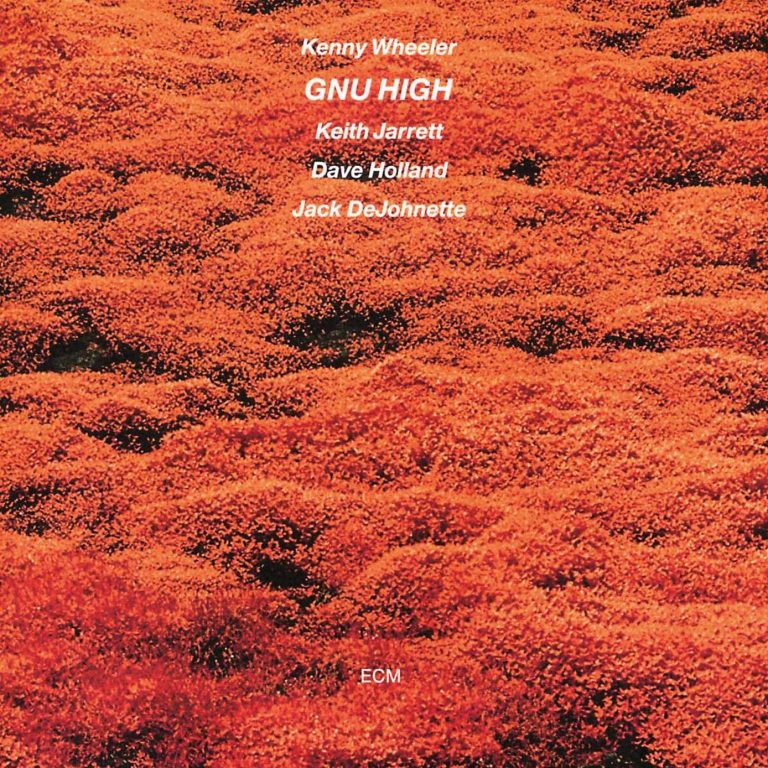The late, Canadian born, British based trumpet and flugelhorn player Kenny Wheeler is an intriguing figure in jazz. Devoid of ego and known to keep himself to himself, he was an unassuming person, who by the mid-70s was already an experienced sideman and had made celebrated big band records. Yet a shift in his compositional approach, which would really put him on the map, was just around the corner.

KENNY WHEELER Gnu High
Available to purchase from our US store.With “Gnu High”, Wheeler’s 1976 debut for the ECM label, he would lay the foundations for what was to come. Representing not just a pivotal moment in his own career – seeing him work with a small ensemble for the first time, it also ranks as a standout work among the storied back catalogue of the label.
Wheeler was known for being the quiet man of jazz. A shy and retiring individual, he was often self-critical to the point of not understanding why his work would achieve success and adoration. He was in many ways the polar opposite of the more flamboyant or difficult characters in the history of jazz. A Miles Davis he was not.
His early big band releases consisted of 1968’s “Windmill Tilter”, recorded with the John Dankworth Orchestra and 1973’s “Song for Someone”. Both records had achieved considerable acclaim, but with “Gnu High”, Wheeler’s stock rose to a new level altogether.
The album is notable for its extraordinary band; Wheeler’s three sidemen were all legendary musicians in their own right – and alumni of Miles Davis’s band. Keith Jarrett puts in his last ever turn as a sideman on piano, while Dave Holland is on the bass and Jack DeJohnette plays drums. Each musician an exceptional improviser.
The record consists of three cuts, with over half the forty minute run time taken up by opener “Heyoke”. This lengthy piece shifts and changes organically over its duration, with Wheeler’s flugelhorn tone varying from warm and lyrical to a more cutting sound with almost the attack of a trumpet. Jarrett has no less than three solos during the piece – the first and third accompanied by bass and drums – while at its midpoint, the track is pared down to just the pianist’s emotive playing, providing a contemplative interlude during the composition. The rest of the band then kick back into action with Wheeler’s exploratory approach taking centre stage once again.
“Heyoke” continues to shift and wind, with the players dancing around each other, before the track cuts to DeJohnnette hitting nothing but cymbals and then the rim of his snare. The quartet come back together to round out the piece. It’s a stirring end to a track that highlights both the astonishing compositional ability of Wheeler and the improvisational approach of each musician.
Middle track “Smatter”, the shortest of the trio of pieces at just shy of six minutes, swings along giving a real showcase to the detailed and precise drumming of DeJohnette and the wandering basslines of Holland. At the same time, Wheeler’s rich but often subtle flugelhorn tone calls out over the top, picking out glorious and rousing melodies. The track also of course boasts yet more mind-bending soloing from Jarrett.
Finishing off the set, “Gnu Suite” features some of the finest interplay between the four musicians anywhere on the album as it shifts from languid contemplation to a crisp but laid-back groove. Part way through, Dave Holland takes centre stage with a dextrous bass solo, while DeJohnette’s solo is a full kit drum workout. Like the rest of the compositions here, “Gnu Suite” gives each instrument room to breathe while the players come together to create a whole that is much more than the sum of its parts.
The record documents the meeting of four greats, each at their very best. Its versatile compositions make it a post-bop classic and a standout within the ECM back catalogue. This surely is a record that no jazz collection should be without.
Read on…Miles Davis – “Ascenseur pour l’échafaud”
Andrew Taylor-Dawson is an Essex based writer and marketer. His music writing has been featured in UK Jazz News, and Songlines. Outside music, he has written for The Ecologist, The Quietus, Byline Times and more.


